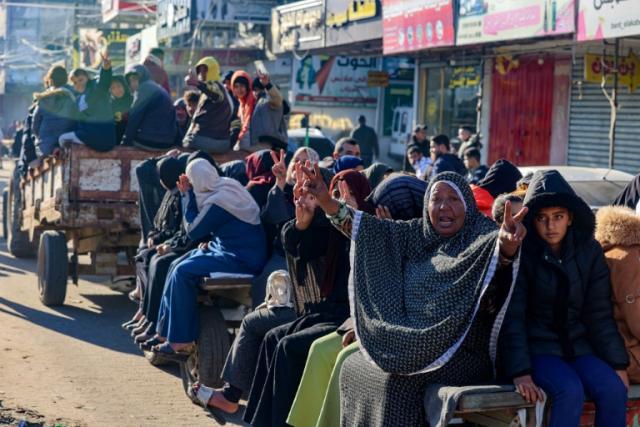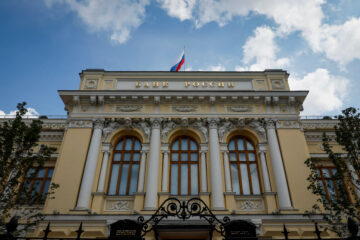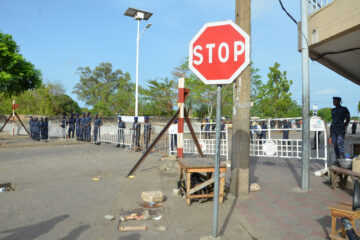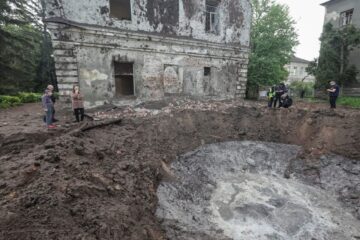Hamas weighs Gaza truce as deadly fighting nears fifth month
 People use a tractor as a means of transportation in Rafah in the southern Gaza Strip on February 4, 2024, as fighting continues between Israel and the Palestinian Hamas group. (Mohammed ABED/AFP)
People use a tractor as a means of transportation in Rafah in the southern Gaza Strip on February 4, 2024, as fighting continues between Israel and the Palestinian Hamas group. (Mohammed ABED/AFP)By Adel Zaanoun with Mark Anderson in Jerusalem AFP
Israeli strikes across Gaza killed scores overnight and battles raged Sunday in the besieged territory’s south as Hamas was reviewing a proposal for a halt in the nearly four-month-long war.
French Foreign Minister Stephane Sejourne was in Egypt and US Secretary of State Antony Blinken expected in the region in the coming days to push for a ceasefire and hostage release.
The health ministry in the Hamas-ruled territory said at least 127 people were killed in Israeli strikes in the past 24 hours in the Gaza Strip, more than 90 of them overnight.
The Hamas government media office said a kindergarten where families were sheltering was hit in the southern border city of Rafah, which is teeming with Palestinians displaced by the war.
“There is no safe place in the Gaza Strip, from north to south,” displaced man Mohammed Kloub told AFP in Rafah, which according to UN figures now hosts more than half of Gaza’s population.
Israel has warned its ground forces could advance on Rafah as part of its campaign to eliminate Hamas militants.
An AFP journalist reported strikes and tank fire on Khan Yunis, southern Gaza’s main city, with some air raids also hitting nearby Rafah.
The army said Sunday its troops raided “a compound used by the commander of Hamas’s Khan Yunis brigade” and seized weapons, also confirming air and naval strikes on the city.
It reported several militants had been killed after attempting to attack Israeli troops.
With the war set to enter a fifth month on Wednesday, international mediators were pressing to seal a proposed truce deal thrashed out in a Paris meeting of top US, Israeli, Egyptian and Qatari officials.
– Gaza rendered ‘unlivable’ –
Sejourne, at the start of his first Middle East tour as foreign minister, said on social media that he told Egyptian President Abdel Fattah al-Sissi of France’s desire “for a humanitarian ceasefire in Gaza and restarting talks for a… two-state solution”.
A top Hamas official in Lebanon, Osama Hamdan, said Saturday the group needed more time to “announce our position”.
Hamdan added that Hamas wanted “to put an end as quickly as possible to the aggression that our people suffer”.
A Hamas source has said the proposal involves an initial six-week pause that would see more aid delivered into Gaza and the phased release of Israeli hostages in exchange for Palestinian prisoners held by Israel.
The war was sparked by Hamas’s unprecedented October 7 attack on Israel, which resulted in the deaths of about 1,160 people, mostly civilians, according to an AFP tally based on official figures.
Militants also seized around 250 hostages, and Israel says 132 remain in Gaza including at least 27 believed to have been killed.
Vowing to eliminate Hamas, Israel launched a massive military offensive that has killed at least 27,365 people in Gaza, mostly women and children, according to the Hamas-ruled territory’s health ministry.
Gazans have faced dire humanitarian conditions, and the UN agency for Palestinian refugees, UNRWA, said on social media platform X that “there is very limited access to clean water and sanitation amid relentless bombardment.”
Experts and rights groups told AFP that Israeli forces have destroyed buildings near the border in an attempt to create a buffer zone inside the Palestinian territory.
Israel has not publicly confirmed the plan, which Nadia Hardman, an expert on refugees at Human Rights Watch, said “may amount to a war crime”.
“We are seeing mounting evidence that Israel appears to be rendering large parts of Gaza unlivable,” she said.
– ‘Turmoil’ across region –
Concern for hostages still in Gaza and security failures surrounding the October 7 attack — the deadliest in Israel’s 75-year history — have led to criticism of Prime Minister Benjamin Netanyahu and rallies against the government.
Michal Hadas, protesting in Tel Aviv on Saturday night, told AFP she feared Israel’s leaders were dragging out the conflict for political reasons, “because as long as the war continues there will be no election”.
The war has also sent regional tensions soaring, with a surge in attacks by Iran-backed groups in solidarity with Gaza triggering counterattacks by key Israel ally the United States.
The United States and its partner Britain said they struck dozens of targets in Yemen late Saturday in response to repeated attacks on shipping by Iran-backed Huthi rebels.
A Huthi spokesman said the latest wave of air strikes “will not pass without response and punishment”.
Iran said the attacks “contradicted” US and UK statements on preventing regional escalation, and Hamas warned the strikes would bring “further turmoil” to the Middle East.










